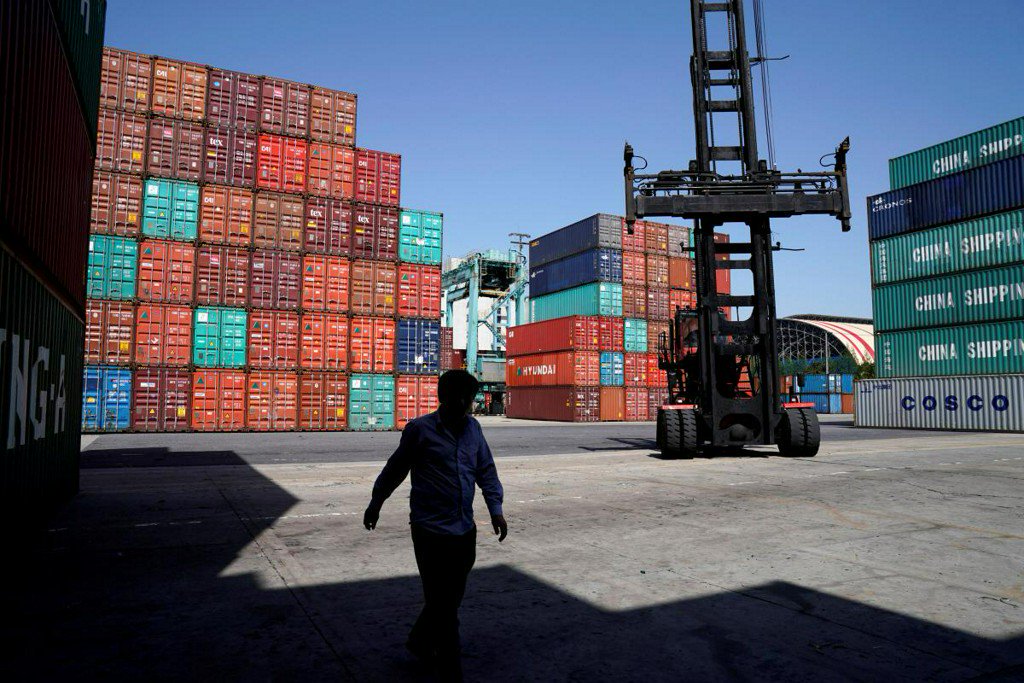GLOBAL MARKETS-Trade nerves, bond yields and $80 oil buffet stocks

World stocks struggled to make headway on Tuesday after another round of U.S.-China tariffs kicked in and investors' nerves were frayed by rising expectations of central bank rate hikes and oil prices near four-year highs.
Following falls across Asian share markets, European bourses opened firmer, with a pan-European index up 0.2 percent. MSCI's main index of world stocks traded flat, though it is holding just under six-month highs hit earlier this month.
Beijing and Washington have imposed new tariffs on each other's goods and Chinese Vice Commerce Minister Wang Shouwen on Tuesday accused the United States of putting "a knife to China's neck".
Neither side appears ready for compromise, worrying investors the conflict is fast-becoming a protracted battle that will chill investment and hurt global trade.
The developments pushed Wall Street lower on Monday though futures indicated a slightly higher open.
"Markets have tried hard to shrug off the implications of an escalating trade spat on global trade and growth but this is becoming harder with each fresh round of tariffs and will slowly but surely take its toll on investor sentiment," Jasper Lawler, head of Research at London Capital Group, said.
There are other big worries for investors too, not least the timing and pace of central bank policy tightening.
While the U.S. Federal Reserve will almost certainly hike rates for a third time in 2018 this week, European Central Bank President Mario Draghi on Monday raised expectations the euro zone will also start to normalize policy over the coming year by referring to 'relatively vigorous' underlying inflation and brisk wage growth.
That pushed German 10-year bond yields to four-month highs above 0.5 percent, while yields also rose across the euro bloc with money markets now pricing a rate rise by the ECB next September. That's a marked change from a few weeks ago when a move was only expected by December 2019.
U.S. 10-year Treasury yields too rose, touching a new four-month high above 3.10 percent.
Goldman Sachs analysts noted a change in how markets were viewing rising bond yields -- having considered them a signal of improving growth and hence a positive for equities, higher bond yields were becoming attractive in their own right, they said.
"With U.S. 10-year bond yield above 3 percent and U.S. real yields close to 1 percent, the risk, especially to equities from rates, is now back in focus," they told clients in a note.
"We think the bar for investing in risky assets is rising as returns on safer assets are becoming more attractive."
Currency markets were mostly quiet as investors watched from the sidelines before the Fed meeting.
The euro eked out a small rise to $1.177 after rising above $1.18 after Draghi's comments on inflation while the dollar index was flat having inched off two-month lows hit at the end of last week.
The dollar's three percent reversal since mid-August has given some respite to emerging markets in recent days but MSCI's emerging equity index slipped 0.4 percent while most currencies also weakened, anticipating a hawkish tone from the Fed.
The yuan was a touch weaker as most investors expect Chinese authorities to not follow the Fed in raising rates.
Oil prices are also becoming a concern. They surged more than three percent on Monday after Russia and OPEC leader Saudi Arabia resisted pressure to raise crude output to offset the expected hit to supply from U.S. sanctions against Iran.
Brent crude futures rose to as high as $81.69 a barrel on Tuesday, a level not seen since November 2014.
ALSO READ
GLOBAL MARKETS-Nikkei leads Asia higher as yen skids; commodities in demand
GLOBAL MARKETS-Shares, yields wobble on unclear rate cut timing
GLOBAL MARKETS-Nikkei leads Asia higher as yen slips; commodities on a roll
GLOBAL MARKETS-Stocks and bonds take heart from Powell; commodities strong
GLOBAL MARKETS-Stocks and bonds take heart from Powell; commodities on a roll










